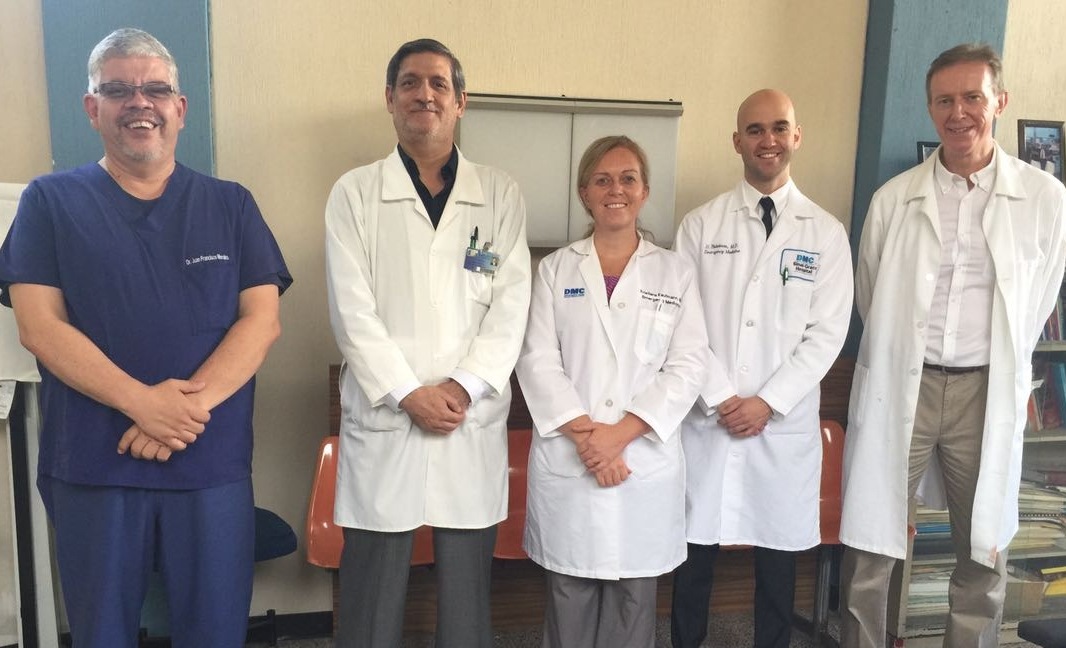
From left: San Juan De Dios hospital general's Chief of Emergency Surgery Dr. Francisco Morales and Emergency Department Chair Dr. Mario Contreras; Wayne State University School of Medicine's International Emergency Medicine Program Director and Assistant Professor of Emergency Medicine Kristiana Kaufmann, M.D., and Associate Director of International Emergency Medicine and Assistant Professor Daniel Ridelman, M.D.; and University of Pennsylvania Professor of Emergency Medicine Anthony Dean, M.D.
A recent collaboration between the Wayne State University School of Medicine and the University of Pennsylvania Perelman School of Medicine has led to the ongoing development of the first certified Emergency Medicine residencies in Guatemala.
WSU Assistant Professor of Emergency Medicine Daniel Ridelman, M.D., F.A.C.E.P., who attended the University of San Carlos medical school in Guatemala and trained in Emergency Medicine at the Detroit Medical Center's Sinai Grace Hospital, is working closely with several Guatemalan institutions and Anthony Dean, M.D., an Emergency Medicine professor and director of Emergency Ultrasound at the University of Pennsylvania, to establish Emergency Medicine as an official medical specialty in Guatemala. They are developing dedicated training slots possibly partially funded by the Guatemalan government and the country's major universities, including the University of San Carlos and Marroquin University. The United States government awarded Dr. Dean a nine-month Fulbright Scholarship to live in Guatemala while developing a curriculum, training the first group of residents, mentoring faculty members, establishing a specialty society, arranging meetings and more.
Dr. Ridelman anticipates the first class of residents will matriculate in 2018.
"In a short amount of time we organized the first Emergency Medicine congress, held April 26-28 in Guatemala City, with 18 visiting faculty from Canada, the United States, El Salvador, Costa Rica, Chile and Argentina; created on paper the first Emergency Medicine residency program pending approval of funding by the Ministry of Health and the social security system; and established the foundations of the future Guatemalan Association of Emergency Medicine," he said.
Dr. Ridelman also created the related website www.agme.org.gt, and manages the Twitter handle @AGME.
"We have encountered some roadblocks recently, but I remain optimistic and committed to the development of Emergency Medicine as a new specialty in the country," he said.
The University of Pennsylvania's Department of Emergency Medicine has been involved with Guatemalan health care initiatives since 2003 through teaching missions and disaster relief efforts when it was recognized that emergency treatment in Guatemalan regional hospitals is often led by providers in their senior year of medical school or first year of residency. Since then, partnerships have been forged with other U.S.-based entities interested in global health and international Emergency Medicine, including WSU, as well as the International Section of the American College of Emergency Physicians and the International Federation of Emergency Medicine. A related case study, "The Guatemala-Penn Partners: An Innovative Inter-Institutional Model for Scientific Capacity-Building, Healthcare Education, and Public Health," was published in the April 10 issue of Frontiers in Public Health.